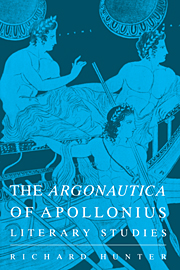Book contents
- Frontmatter
- Contents
- Preface
- List of abbreviations
- 1 Introduction
- 2 Modes of heroism
- 3 Images of love
- 4 The gods and the divine
- 5 The poet and his poem
- 6 The Argonautica and its Ptolemaic context
- 7 Argonautica and Aeneid
- Appendix: ἓν ἂισμα διηνκές: Aristotle, Callimachus, Apollonius
- Bibliography
- General index
- Index of passages discussed
7 - Argonautica and Aeneid
Published online by Cambridge University Press: 02 December 2009
- Frontmatter
- Contents
- Preface
- List of abbreviations
- 1 Introduction
- 2 Modes of heroism
- 3 Images of love
- 4 The gods and the divine
- 5 The poet and his poem
- 6 The Argonautica and its Ptolemaic context
- 7 Argonautica and Aeneid
- Appendix: ἓν ἂισμα διηνκές: Aristotle, Callimachus, Apollonius
- Bibliography
- General index
- Index of passages discussed
Summary
The study of how the Argonautica is exploited in the Aeneid has a long, and occasionally distinguished, history. That it has not advanced further than it has is due to a number of factors, most notably the relative paucity of serious literary critical work on Apollonius' epic; until we have learned to appreciate the Argonautica, we can hardly expect to understand how Virgil read it and used it. Moreover, too much of what has been written on this subject – particularly by critics whose primary interest is in the Aeneid – betrays a depressing unwillingness to take the Greek poem seriously, indeed often to read all of it, as Virgil manifestly did, with care and attention, let alone with the same critical awareness that is taken for granted in the reading of Virgil. Until very recently, the working assumption of much criticism, whether openly admitted or not, was the great superiority of Virgil as an epic poet, and the purpose of that criticism was to demonstrate the assumption; most surprising of all, this remained largely true even where it was acknowledged that we are dealing with two radically different poetic projects requiring very different approaches. A belief in the superiority of one or the other poet, if based on close study, is harmless enough, and indeed appears to answer a ‘natural’ desire to create hierarchies of merit; if used, however, to block off interpretation such a belief (or assumption) becomes a form of pernicious philistinism.
- Type
- Chapter
- Information
- The Argonautica of Apollonius , pp. 170 - 189Publisher: Cambridge University PressPrint publication year: 1993
- 1
- Cited by



